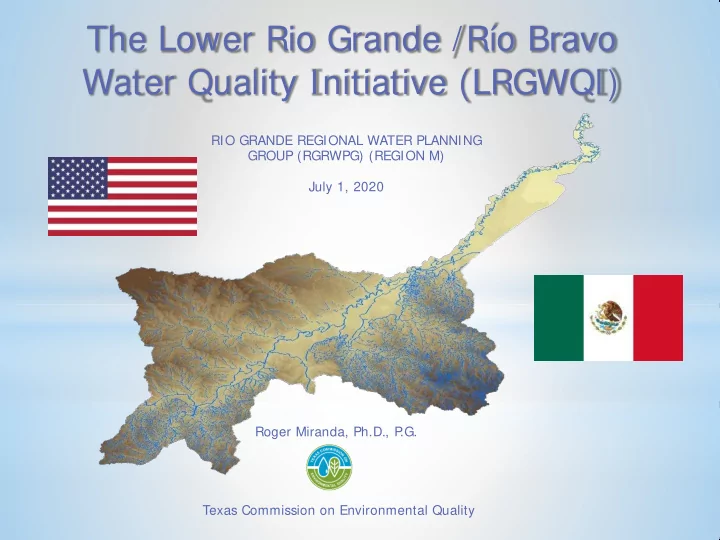

The Lower Rio Grande /Río Bravo Water Quality Initiative (LRGWQI) RIO GRANDE REGIONAL WATER PLANNING GROUP (RGRWPG) (REGION M) July 1, 2020 Roger Miranda, Ph.D., P .G. Texas Commission on Environmental Quality
Water Quality Issues in the Lower Rio Grande/Rio Bravo 2302 2301 230 1 Summary of Water Quality Assessment Results : Lower Rio Grande From TCEQ’s 2020 Integrated Report Segment Description I mpairment Concerns* Segment Year Number Listed 2302 Rio Grande Below Falcon Reservoir Bacteria 1996 Ammonia Nutrients Dissolved Oxygen 2301 Rio Grande Tidal NA NA Dissolved Oxygen Bacteria Nutrients *S alinity is also a big local concern
The Lower Rio Grande/Río Bravo Water Quality Initiative * Binat ional effort t o rest ore and prot ect wat er qualit y in t he Lower Rio Grande/ Río Bravo * Conduct ed under t he auspices of t he Int ernat ional Boundary and Wat er Commission (CILA/ IBWC) * S ix agencies involved: US Mexico IBWC, US EP A, TCEQ CILA, CONAGUA, S EDUMA/ CEAT
Terms of Reference * Exchange of Letters S igned S eptember, 2013 * Developed Common Terms of Reference (TOR) for the Proj ect * The TOR established the study area, goals and obj ectives of the proj ect and the structure of the binational working groups * Established a Core Group of agency representatives and a Binational Technical Work Group to advise the Core Group
S tudy Area
LRGWQI Obj ectives • Address current and future water quality issues • Evaluate management strategies for point sources • Evaluate other mechanisms and strategies to improve water quality under steady-state conditions, including salinity management • S uggest implementation strategies Goal = “ Binational Watershed Based Plan”
LRGWQI Obj ectives • Address current and future water quality issues • Evaluate management strategies for point sources • Evaluate other mechanisms and strategies to improve water quality under steady-state conditions, including salinity management • S uggest implementation strategies Goal = “Binational Watershed Based Plan”
Technical Approach • Binational Data Exchange • Historical Data Review • Identification of Data Gaps • Data Collection • Data Analysis and Modeling
Technical Approach • Binational Data Exchange • Historical Data Review • Identification of Data Gaps • Data Collection • Data Analysis and Modeling
Work Completed S ince S eptember of 2013 • 5 S ynoptic S urveys of Water Quality (2014-2016) • Watershed Characterization Report • Historical Data Review and Analysis • Point S ource Analysis • Geospatial Analysis (Nonpoint S ources) • 5 LA-QUAL Models Developed • Decision S upport S oftware Developed
LRGWQI Decision S upport S ystem • A decision support tool for the LRGWQI • Nonproprietary software (Open S ource) • GIS interface • S imulates the effects on water quality of various planning scenarios* • Economics module *Goal: suitable for planning needs - user needn’ t be a water quality modeler
Next S teps in the LRGWQI • Establishment of a Local Binational Forum for Information Exchange • Development of Binational Recommendations to improve water quality • Completion of Binational WBP Based on Local Input • Institutionalization of Binational Agreement (Joint Engineering Report, Exchange of Letters, or Treaty Minute) • Implementation –Additional S takeholder Input, Binational financing and coordination
Roger Miranda roger.miranda@tceq.texas.gov (512)239-6278 http://www.tceq.texas.gov/waterquality/tmdl
Recommend
More recommend